The Impact of Constitutional Amendments on Criminal and Juvenile Law
VerifiedAdded on 2023/04/20
|8
|1856
|157
Essay
AI Summary
This essay examines the Fourth, Fifth, and Sixth Amendments of the American Constitution and their implications for criminal law, with a specific focus on juvenile rights. It discusses the protections offered by each amendment, including the right to protection from unreasonable search and seizure, self-incrimination, and the right to counsel. The essay further explores how these rights apply to juveniles within the juvenile court system, highlighting key Supreme Court cases that have shaped the interpretation and application of these constitutional protections. Finally, it analyzes the impact of these amendments on court procedures, including the exclusionary rule, double jeopardy, due process, and the right to a speedy and public trial, emphasizing the balance between protecting individual liberties and ensuring fair and efficient legal proceedings. Desklib offers a variety of resources, including past papers and solved assignments, to aid students in understanding these complex legal concepts.
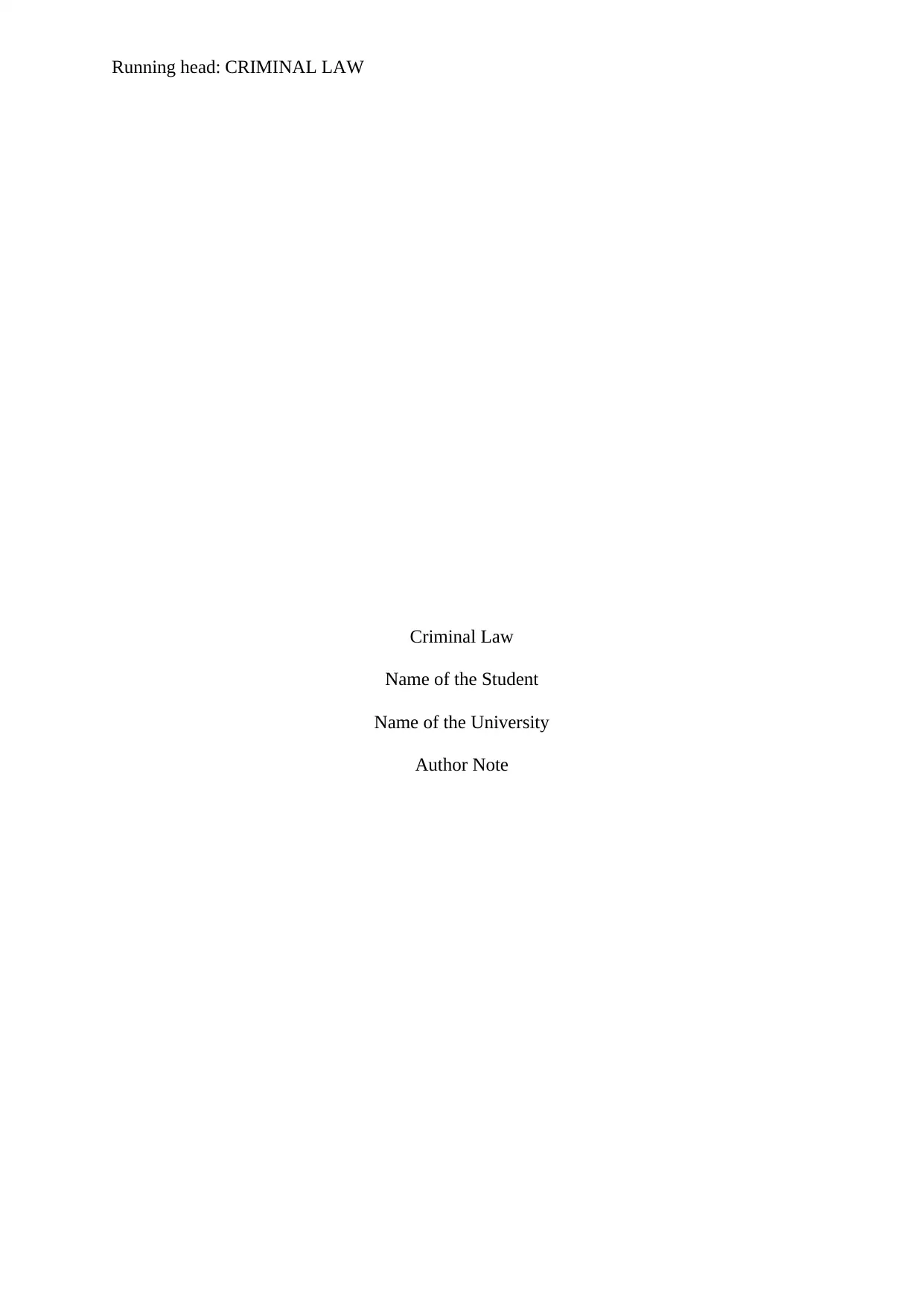
Running head: CRIMINAL LAW
Criminal Law
Name of the Student
Name of the University
Author Note
Criminal Law
Name of the Student
Name of the University
Author Note
Paraphrase This Document
Need a fresh take? Get an instant paraphrase of this document with our AI Paraphraser
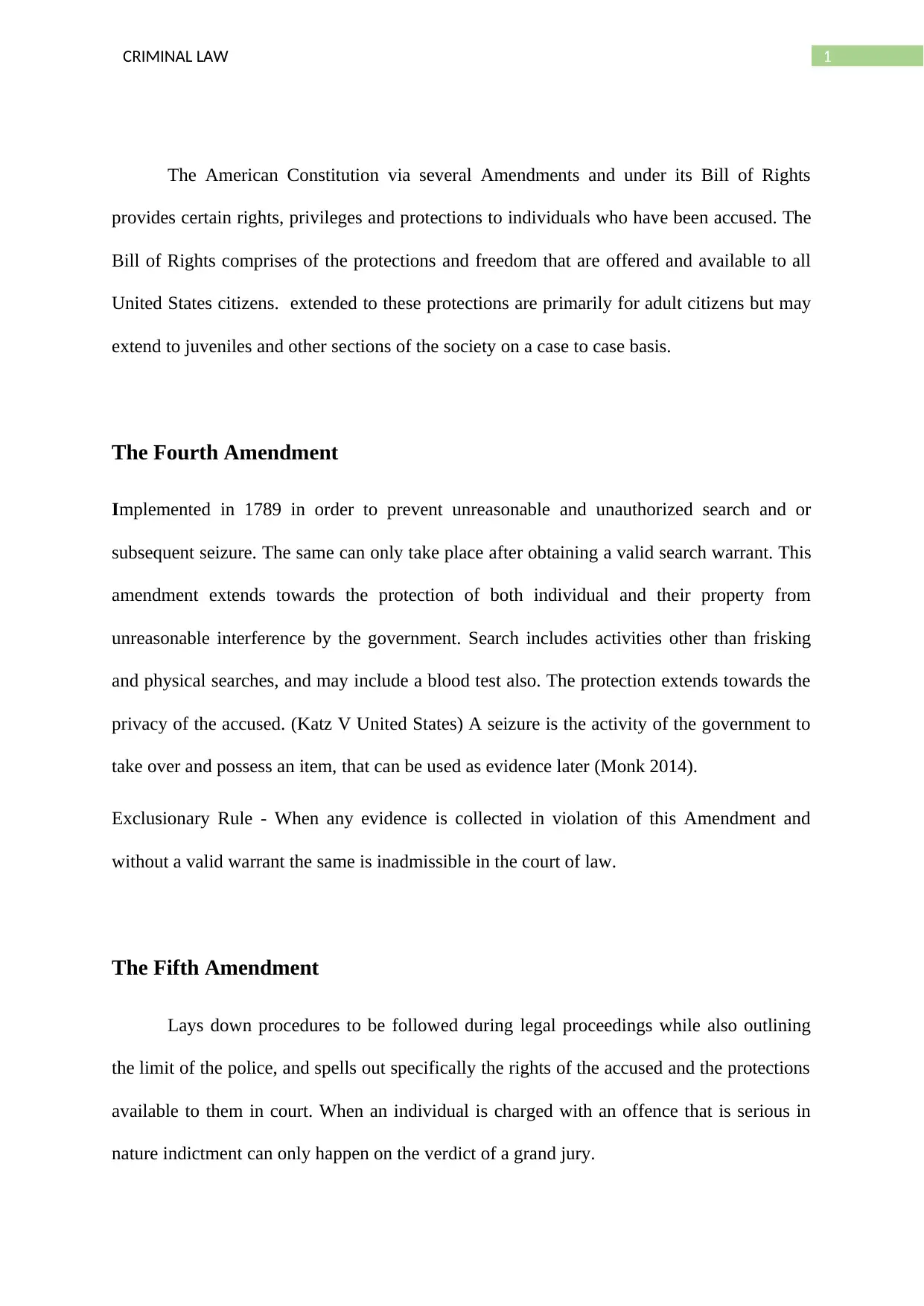
1CRIMINAL LAW
The American Constitution via several Amendments and under its Bill of Rights
provides certain rights, privileges and protections to individuals who have been accused. The
Bill of Rights comprises of the protections and freedom that are offered and available to all
United States citizens. extended to these protections are primarily for adult citizens but may
extend to juveniles and other sections of the society on a case to case basis.
The Fourth Amendment
Implemented in 1789 in order to prevent unreasonable and unauthorized search and or
subsequent seizure. The same can only take place after obtaining a valid search warrant. This
amendment extends towards the protection of both individual and their property from
unreasonable interference by the government. Search includes activities other than frisking
and physical searches, and may include a blood test also. The protection extends towards the
privacy of the accused. (Katz V United States) A seizure is the activity of the government to
take over and possess an item, that can be used as evidence later (Monk 2014).
Exclusionary Rule - When any evidence is collected in violation of this Amendment and
without a valid warrant the same is inadmissible in the court of law.
The Fifth Amendment
Lays down procedures to be followed during legal proceedings while also outlining
the limit of the police, and spells out specifically the rights of the accused and the protections
available to them in court. When an individual is charged with an offence that is serious in
nature indictment can only happen on the verdict of a grand jury.
The American Constitution via several Amendments and under its Bill of Rights
provides certain rights, privileges and protections to individuals who have been accused. The
Bill of Rights comprises of the protections and freedom that are offered and available to all
United States citizens. extended to these protections are primarily for adult citizens but may
extend to juveniles and other sections of the society on a case to case basis.
The Fourth Amendment
Implemented in 1789 in order to prevent unreasonable and unauthorized search and or
subsequent seizure. The same can only take place after obtaining a valid search warrant. This
amendment extends towards the protection of both individual and their property from
unreasonable interference by the government. Search includes activities other than frisking
and physical searches, and may include a blood test also. The protection extends towards the
privacy of the accused. (Katz V United States) A seizure is the activity of the government to
take over and possess an item, that can be used as evidence later (Monk 2014).
Exclusionary Rule - When any evidence is collected in violation of this Amendment and
without a valid warrant the same is inadmissible in the court of law.
The Fifth Amendment
Lays down procedures to be followed during legal proceedings while also outlining
the limit of the police, and spells out specifically the rights of the accused and the protections
available to them in court. When an individual is charged with an offence that is serious in
nature indictment can only happen on the verdict of a grand jury.
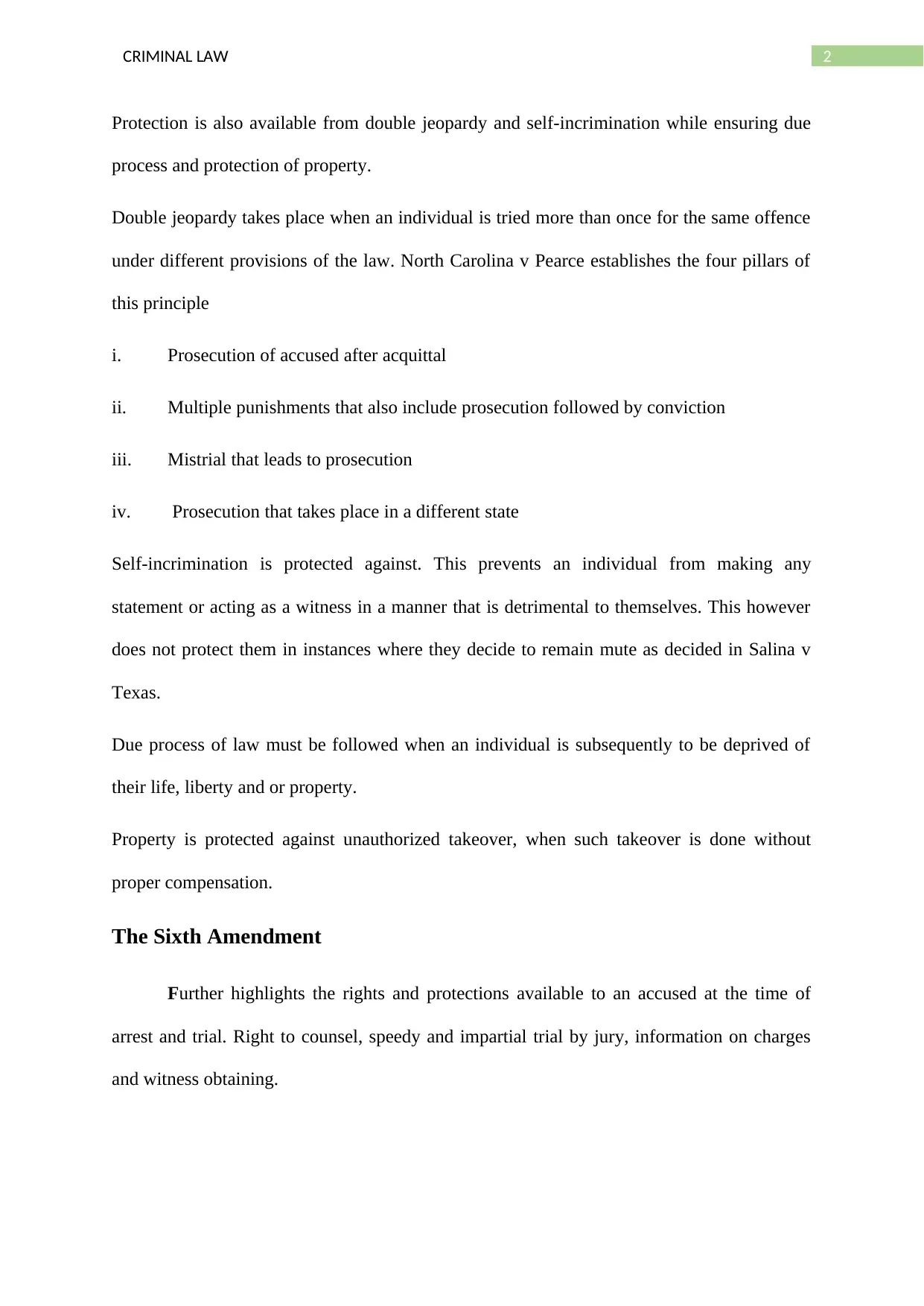
2CRIMINAL LAW
Protection is also available from double jeopardy and self-incrimination while ensuring due
process and protection of property.
Double jeopardy takes place when an individual is tried more than once for the same offence
under different provisions of the law. North Carolina v Pearce establishes the four pillars of
this principle
i. Prosecution of accused after acquittal
ii. Multiple punishments that also include prosecution followed by conviction
iii. Mistrial that leads to prosecution
iv. Prosecution that takes place in a different state
Self-incrimination is protected against. This prevents an individual from making any
statement or acting as a witness in a manner that is detrimental to themselves. This however
does not protect them in instances where they decide to remain mute as decided in Salina v
Texas.
Due process of law must be followed when an individual is subsequently to be deprived of
their life, liberty and or property.
Property is protected against unauthorized takeover, when such takeover is done without
proper compensation.
The Sixth Amendment
Further highlights the rights and protections available to an accused at the time of
arrest and trial. Right to counsel, speedy and impartial trial by jury, information on charges
and witness obtaining.
Protection is also available from double jeopardy and self-incrimination while ensuring due
process and protection of property.
Double jeopardy takes place when an individual is tried more than once for the same offence
under different provisions of the law. North Carolina v Pearce establishes the four pillars of
this principle
i. Prosecution of accused after acquittal
ii. Multiple punishments that also include prosecution followed by conviction
iii. Mistrial that leads to prosecution
iv. Prosecution that takes place in a different state
Self-incrimination is protected against. This prevents an individual from making any
statement or acting as a witness in a manner that is detrimental to themselves. This however
does not protect them in instances where they decide to remain mute as decided in Salina v
Texas.
Due process of law must be followed when an individual is subsequently to be deprived of
their life, liberty and or property.
Property is protected against unauthorized takeover, when such takeover is done without
proper compensation.
The Sixth Amendment
Further highlights the rights and protections available to an accused at the time of
arrest and trial. Right to counsel, speedy and impartial trial by jury, information on charges
and witness obtaining.
⊘ This is a preview!⊘
Do you want full access?
Subscribe today to unlock all pages.

Trusted by 1+ million students worldwide
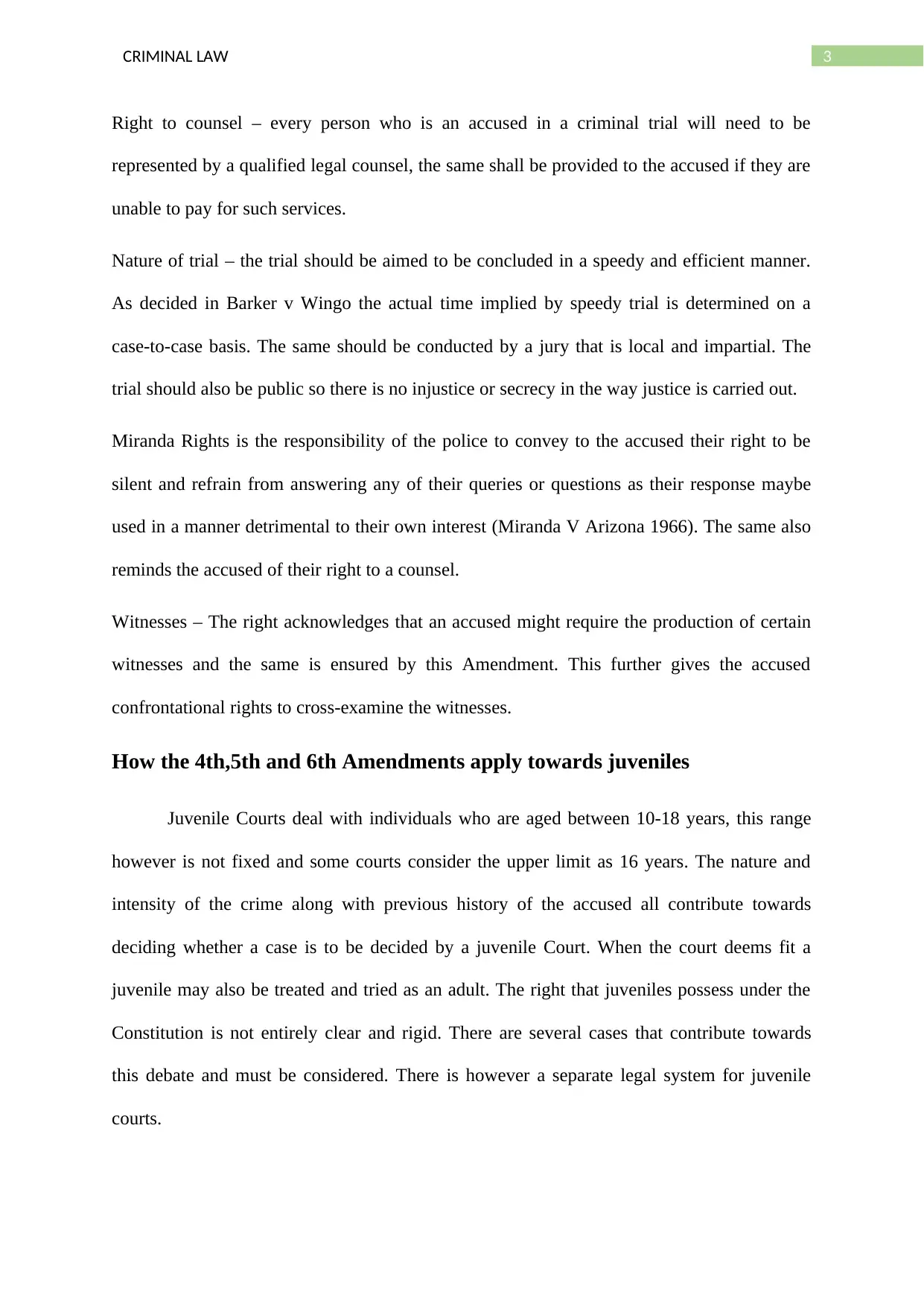
3CRIMINAL LAW
Right to counsel – every person who is an accused in a criminal trial will need to be
represented by a qualified legal counsel, the same shall be provided to the accused if they are
unable to pay for such services.
Nature of trial – the trial should be aimed to be concluded in a speedy and efficient manner.
As decided in Barker v Wingo the actual time implied by speedy trial is determined on a
case-to-case basis. The same should be conducted by a jury that is local and impartial. The
trial should also be public so there is no injustice or secrecy in the way justice is carried out.
Miranda Rights is the responsibility of the police to convey to the accused their right to be
silent and refrain from answering any of their queries or questions as their response maybe
used in a manner detrimental to their own interest (Miranda V Arizona 1966). The same also
reminds the accused of their right to a counsel.
Witnesses – The right acknowledges that an accused might require the production of certain
witnesses and the same is ensured by this Amendment. This further gives the accused
confrontational rights to cross-examine the witnesses.
How the 4th,5th and 6th Amendments apply towards juveniles
Juvenile Courts deal with individuals who are aged between 10-18 years, this range
however is not fixed and some courts consider the upper limit as 16 years. The nature and
intensity of the crime along with previous history of the accused all contribute towards
deciding whether a case is to be decided by a juvenile Court. When the court deems fit a
juvenile may also be treated and tried as an adult. The right that juveniles possess under the
Constitution is not entirely clear and rigid. There are several cases that contribute towards
this debate and must be considered. There is however a separate legal system for juvenile
courts.
Right to counsel – every person who is an accused in a criminal trial will need to be
represented by a qualified legal counsel, the same shall be provided to the accused if they are
unable to pay for such services.
Nature of trial – the trial should be aimed to be concluded in a speedy and efficient manner.
As decided in Barker v Wingo the actual time implied by speedy trial is determined on a
case-to-case basis. The same should be conducted by a jury that is local and impartial. The
trial should also be public so there is no injustice or secrecy in the way justice is carried out.
Miranda Rights is the responsibility of the police to convey to the accused their right to be
silent and refrain from answering any of their queries or questions as their response maybe
used in a manner detrimental to their own interest (Miranda V Arizona 1966). The same also
reminds the accused of their right to a counsel.
Witnesses – The right acknowledges that an accused might require the production of certain
witnesses and the same is ensured by this Amendment. This further gives the accused
confrontational rights to cross-examine the witnesses.
How the 4th,5th and 6th Amendments apply towards juveniles
Juvenile Courts deal with individuals who are aged between 10-18 years, this range
however is not fixed and some courts consider the upper limit as 16 years. The nature and
intensity of the crime along with previous history of the accused all contribute towards
deciding whether a case is to be decided by a juvenile Court. When the court deems fit a
juvenile may also be treated and tried as an adult. The right that juveniles possess under the
Constitution is not entirely clear and rigid. There are several cases that contribute towards
this debate and must be considered. There is however a separate legal system for juvenile
courts.
Paraphrase This Document
Need a fresh take? Get an instant paraphrase of this document with our AI Paraphraser
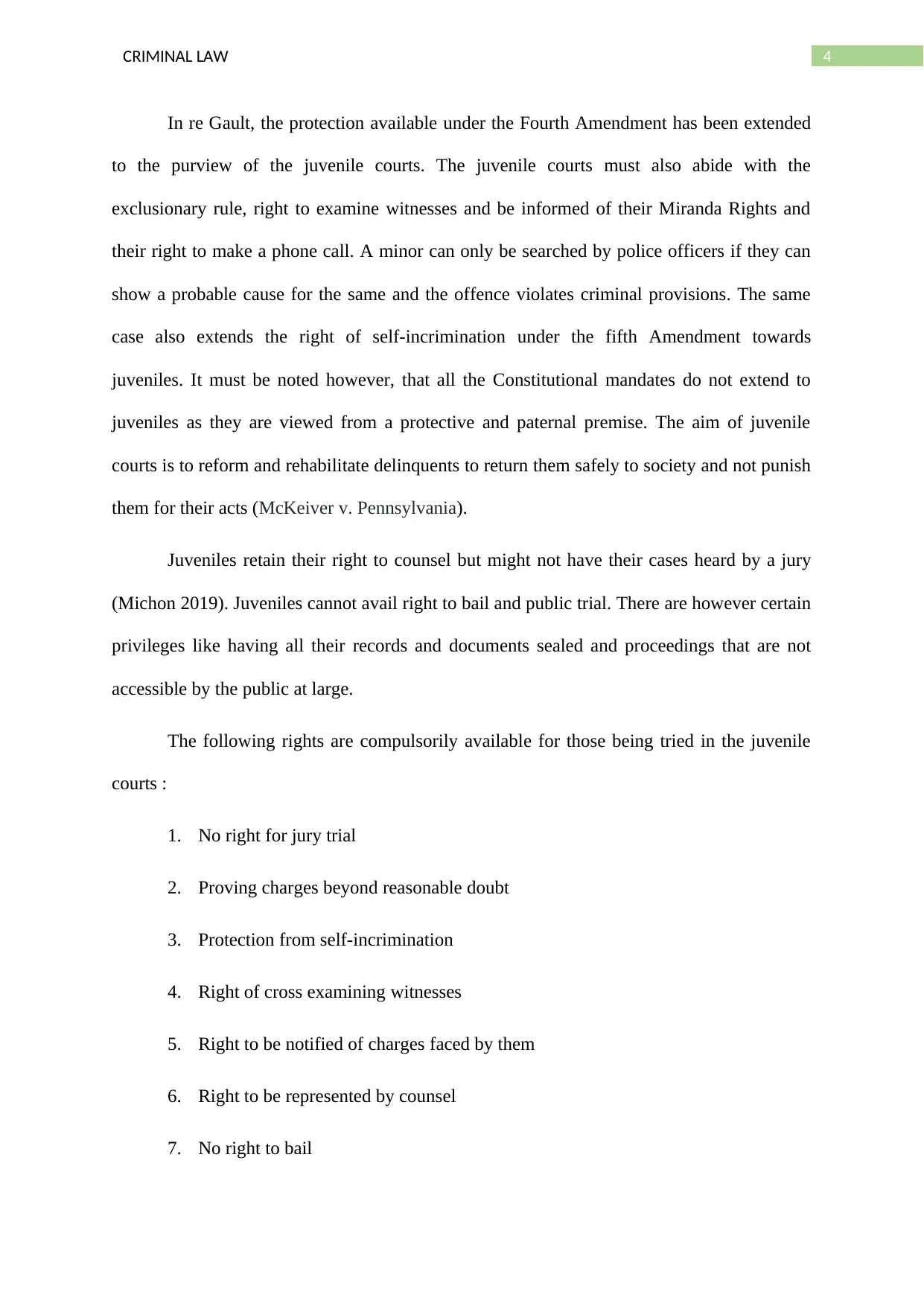
4CRIMINAL LAW
In re Gault, the protection available under the Fourth Amendment has been extended
to the purview of the juvenile courts. The juvenile courts must also abide with the
exclusionary rule, right to examine witnesses and be informed of their Miranda Rights and
their right to make a phone call. A minor can only be searched by police officers if they can
show a probable cause for the same and the offence violates criminal provisions. The same
case also extends the right of self-incrimination under the fifth Amendment towards
juveniles. It must be noted however, that all the Constitutional mandates do not extend to
juveniles as they are viewed from a protective and paternal premise. The aim of juvenile
courts is to reform and rehabilitate delinquents to return them safely to society and not punish
them for their acts (McKeiver v. Pennsylvania).
Juveniles retain their right to counsel but might not have their cases heard by a jury
(Michon 2019). Juveniles cannot avail right to bail and public trial. There are however certain
privileges like having all their records and documents sealed and proceedings that are not
accessible by the public at large.
The following rights are compulsorily available for those being tried in the juvenile
courts :
1. No right for jury trial
2. Proving charges beyond reasonable doubt
3. Protection from self-incrimination
4. Right of cross examining witnesses
5. Right to be notified of charges faced by them
6. Right to be represented by counsel
7. No right to bail
In re Gault, the protection available under the Fourth Amendment has been extended
to the purview of the juvenile courts. The juvenile courts must also abide with the
exclusionary rule, right to examine witnesses and be informed of their Miranda Rights and
their right to make a phone call. A minor can only be searched by police officers if they can
show a probable cause for the same and the offence violates criminal provisions. The same
case also extends the right of self-incrimination under the fifth Amendment towards
juveniles. It must be noted however, that all the Constitutional mandates do not extend to
juveniles as they are viewed from a protective and paternal premise. The aim of juvenile
courts is to reform and rehabilitate delinquents to return them safely to society and not punish
them for their acts (McKeiver v. Pennsylvania).
Juveniles retain their right to counsel but might not have their cases heard by a jury
(Michon 2019). Juveniles cannot avail right to bail and public trial. There are however certain
privileges like having all their records and documents sealed and proceedings that are not
accessible by the public at large.
The following rights are compulsorily available for those being tried in the juvenile
courts :
1. No right for jury trial
2. Proving charges beyond reasonable doubt
3. Protection from self-incrimination
4. Right of cross examining witnesses
5. Right to be notified of charges faced by them
6. Right to be represented by counsel
7. No right to bail
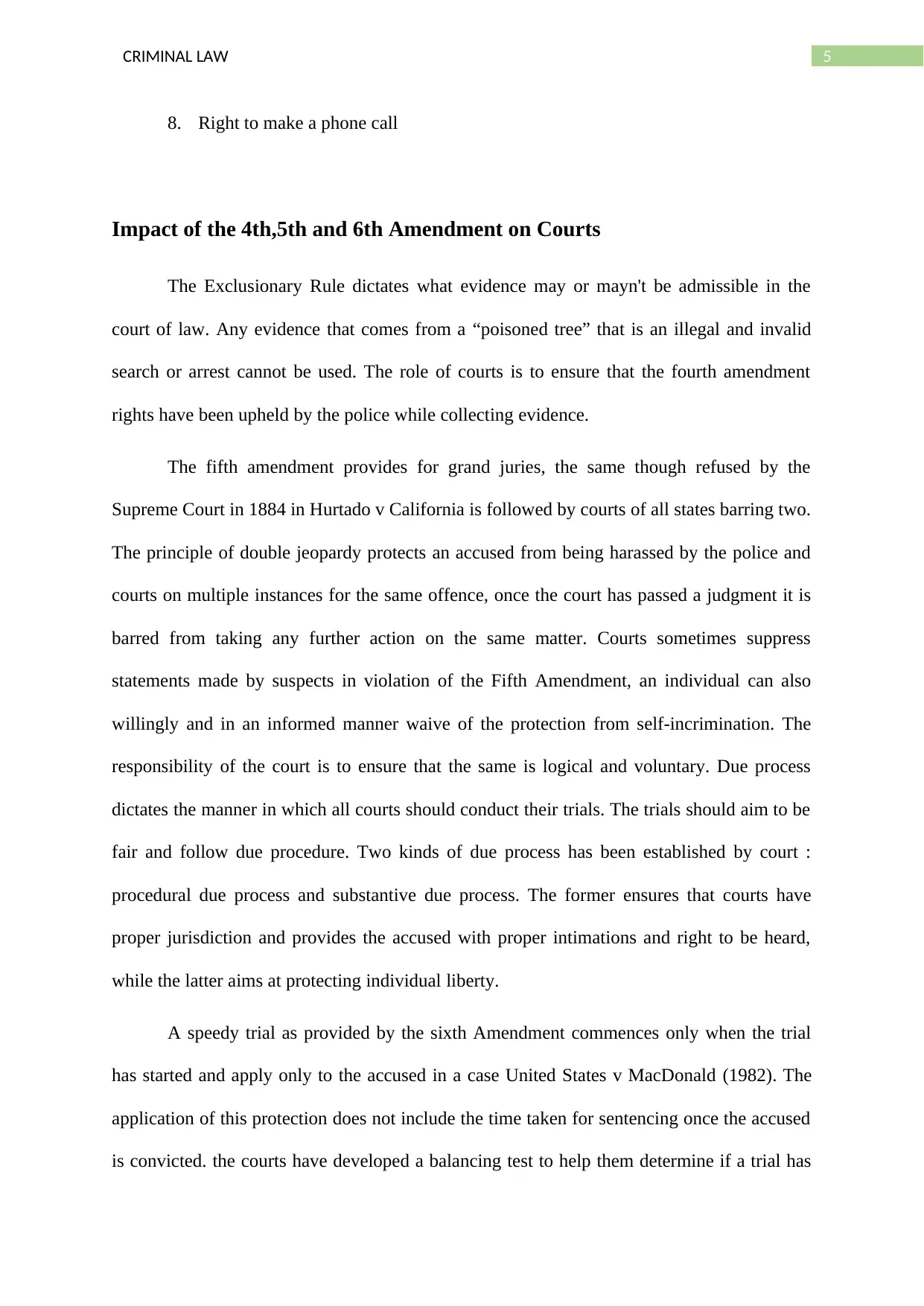
5CRIMINAL LAW
8. Right to make a phone call
Impact of the 4th,5th and 6th Amendment on Courts
The Exclusionary Rule dictates what evidence may or mayn't be admissible in the
court of law. Any evidence that comes from a “poisoned tree” that is an illegal and invalid
search or arrest cannot be used. The role of courts is to ensure that the fourth amendment
rights have been upheld by the police while collecting evidence.
The fifth amendment provides for grand juries, the same though refused by the
Supreme Court in 1884 in Hurtado v California is followed by courts of all states barring two.
The principle of double jeopardy protects an accused from being harassed by the police and
courts on multiple instances for the same offence, once the court has passed a judgment it is
barred from taking any further action on the same matter. Courts sometimes suppress
statements made by suspects in violation of the Fifth Amendment, an individual can also
willingly and in an informed manner waive of the protection from self-incrimination. The
responsibility of the court is to ensure that the same is logical and voluntary. Due process
dictates the manner in which all courts should conduct their trials. The trials should aim to be
fair and follow due procedure. Two kinds of due process has been established by court :
procedural due process and substantive due process. The former ensures that courts have
proper jurisdiction and provides the accused with proper intimations and right to be heard,
while the latter aims at protecting individual liberty.
A speedy trial as provided by the sixth Amendment commences only when the trial
has started and apply only to the accused in a case United States v MacDonald (1982). The
application of this protection does not include the time taken for sentencing once the accused
is convicted. the courts have developed a balancing test to help them determine if a trial has
8. Right to make a phone call
Impact of the 4th,5th and 6th Amendment on Courts
The Exclusionary Rule dictates what evidence may or mayn't be admissible in the
court of law. Any evidence that comes from a “poisoned tree” that is an illegal and invalid
search or arrest cannot be used. The role of courts is to ensure that the fourth amendment
rights have been upheld by the police while collecting evidence.
The fifth amendment provides for grand juries, the same though refused by the
Supreme Court in 1884 in Hurtado v California is followed by courts of all states barring two.
The principle of double jeopardy protects an accused from being harassed by the police and
courts on multiple instances for the same offence, once the court has passed a judgment it is
barred from taking any further action on the same matter. Courts sometimes suppress
statements made by suspects in violation of the Fifth Amendment, an individual can also
willingly and in an informed manner waive of the protection from self-incrimination. The
responsibility of the court is to ensure that the same is logical and voluntary. Due process
dictates the manner in which all courts should conduct their trials. The trials should aim to be
fair and follow due procedure. Two kinds of due process has been established by court :
procedural due process and substantive due process. The former ensures that courts have
proper jurisdiction and provides the accused with proper intimations and right to be heard,
while the latter aims at protecting individual liberty.
A speedy trial as provided by the sixth Amendment commences only when the trial
has started and apply only to the accused in a case United States v MacDonald (1982). The
application of this protection does not include the time taken for sentencing once the accused
is convicted. the courts have developed a balancing test to help them determine if a trial has
⊘ This is a preview!⊘
Do you want full access?
Subscribe today to unlock all pages.

Trusted by 1+ million students worldwide
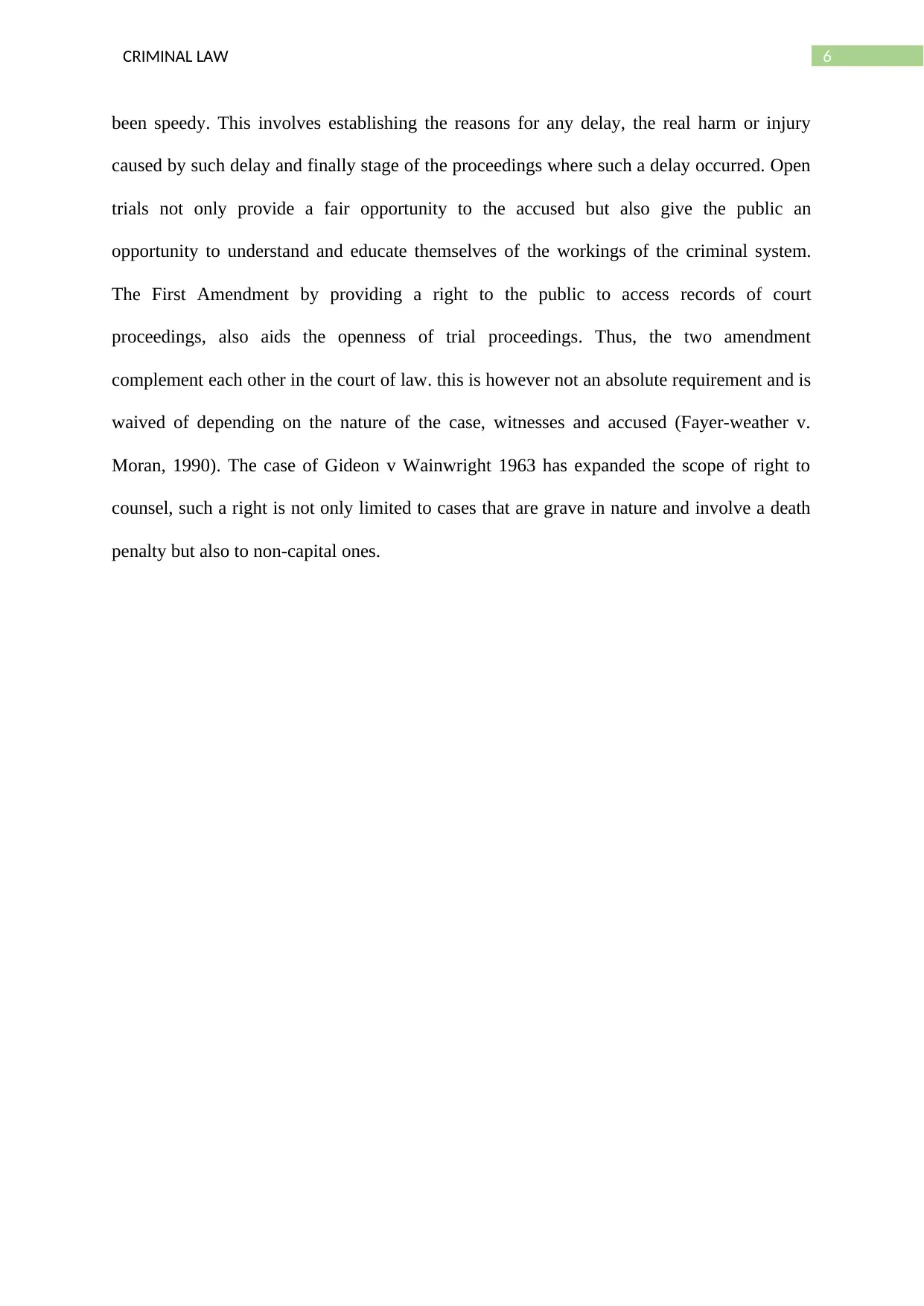
6CRIMINAL LAW
been speedy. This involves establishing the reasons for any delay, the real harm or injury
caused by such delay and finally stage of the proceedings where such a delay occurred. Open
trials not only provide a fair opportunity to the accused but also give the public an
opportunity to understand and educate themselves of the workings of the criminal system.
The First Amendment by providing a right to the public to access records of court
proceedings, also aids the openness of trial proceedings. Thus, the two amendment
complement each other in the court of law. this is however not an absolute requirement and is
waived of depending on the nature of the case, witnesses and accused (Fayer-weather v.
Moran, 1990). The case of Gideon v Wainwright 1963 has expanded the scope of right to
counsel, such a right is not only limited to cases that are grave in nature and involve a death
penalty but also to non-capital ones.
been speedy. This involves establishing the reasons for any delay, the real harm or injury
caused by such delay and finally stage of the proceedings where such a delay occurred. Open
trials not only provide a fair opportunity to the accused but also give the public an
opportunity to understand and educate themselves of the workings of the criminal system.
The First Amendment by providing a right to the public to access records of court
proceedings, also aids the openness of trial proceedings. Thus, the two amendment
complement each other in the court of law. this is however not an absolute requirement and is
waived of depending on the nature of the case, witnesses and accused (Fayer-weather v.
Moran, 1990). The case of Gideon v Wainwright 1963 has expanded the scope of right to
counsel, such a right is not only limited to cases that are grave in nature and involve a death
penalty but also to non-capital ones.
Paraphrase This Document
Need a fresh take? Get an instant paraphrase of this document with our AI Paraphraser
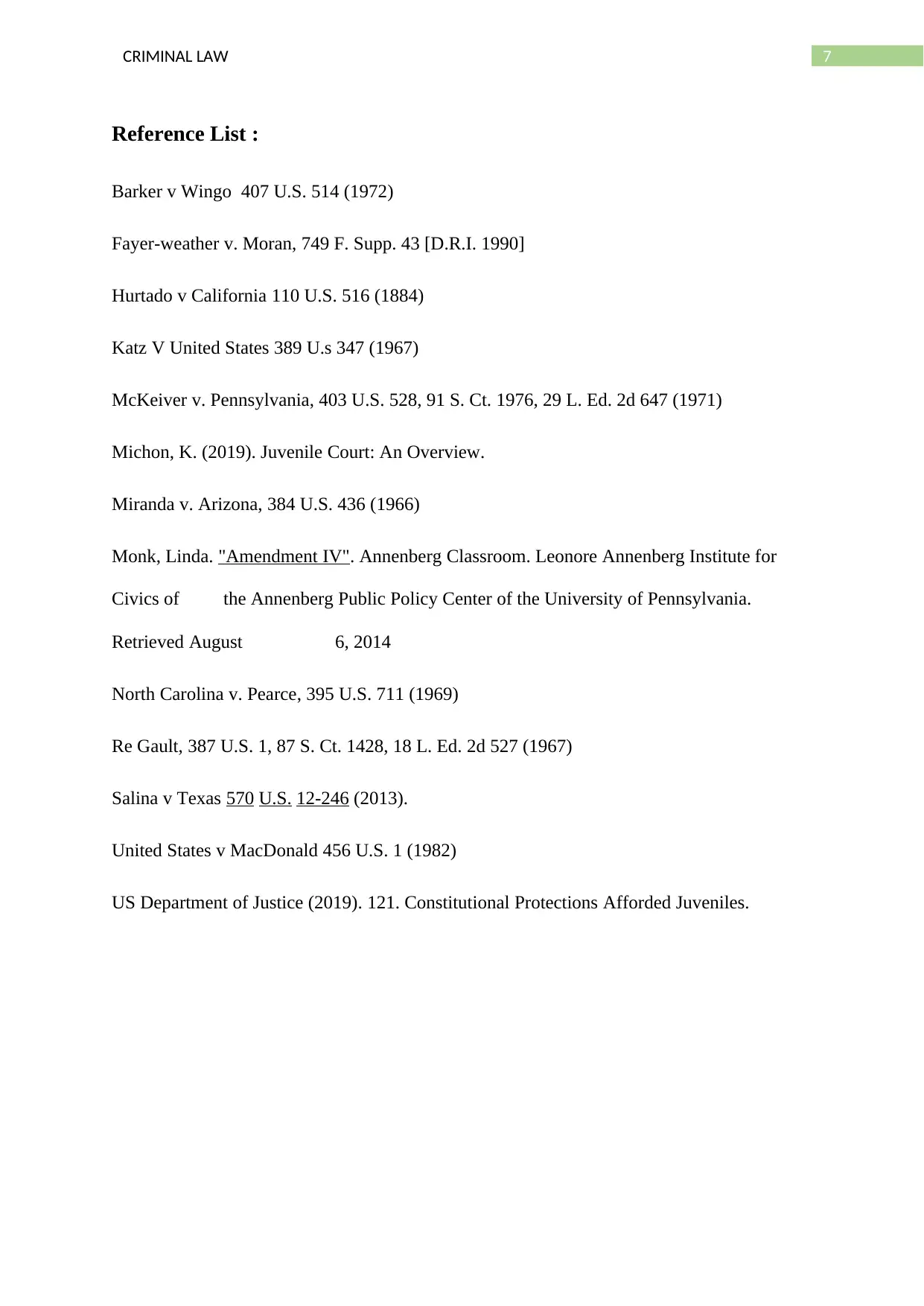
7CRIMINAL LAW
Reference List :
Barker v Wingo 407 U.S. 514 (1972)
Fayer-weather v. Moran, 749 F. Supp. 43 [D.R.I. 1990]
Hurtado v California 110 U.S. 516 (1884)
Katz V United States 389 U.s 347 (1967)
McKeiver v. Pennsylvania, 403 U.S. 528, 91 S. Ct. 1976, 29 L. Ed. 2d 647 (1971)
Michon, K. (2019). Juvenile Court: An Overview.
Miranda v. Arizona, 384 U.S. 436 (1966)
Monk, Linda. "Amendment IV". Annenberg Classroom. Leonore Annenberg Institute for
Civics of the Annenberg Public Policy Center of the University of Pennsylvania.
Retrieved August 6, 2014
North Carolina v. Pearce, 395 U.S. 711 (1969)
Re Gault, 387 U.S. 1, 87 S. Ct. 1428, 18 L. Ed. 2d 527 (1967)
Salina v Texas 570 U.S. 12-246 (2013).
United States v MacDonald 456 U.S. 1 (1982)
US Department of Justice (2019). 121. Constitutional Protections Afforded Juveniles.
Reference List :
Barker v Wingo 407 U.S. 514 (1972)
Fayer-weather v. Moran, 749 F. Supp. 43 [D.R.I. 1990]
Hurtado v California 110 U.S. 516 (1884)
Katz V United States 389 U.s 347 (1967)
McKeiver v. Pennsylvania, 403 U.S. 528, 91 S. Ct. 1976, 29 L. Ed. 2d 647 (1971)
Michon, K. (2019). Juvenile Court: An Overview.
Miranda v. Arizona, 384 U.S. 436 (1966)
Monk, Linda. "Amendment IV". Annenberg Classroom. Leonore Annenberg Institute for
Civics of the Annenberg Public Policy Center of the University of Pennsylvania.
Retrieved August 6, 2014
North Carolina v. Pearce, 395 U.S. 711 (1969)
Re Gault, 387 U.S. 1, 87 S. Ct. 1428, 18 L. Ed. 2d 527 (1967)
Salina v Texas 570 U.S. 12-246 (2013).
United States v MacDonald 456 U.S. 1 (1982)
US Department of Justice (2019). 121. Constitutional Protections Afforded Juveniles.
1 out of 8
Related Documents
Your All-in-One AI-Powered Toolkit for Academic Success.
+13062052269
info@desklib.com
Available 24*7 on WhatsApp / Email
![[object Object]](/_next/static/media/star-bottom.7253800d.svg)
Unlock your academic potential
Copyright © 2020–2026 A2Z Services. All Rights Reserved. Developed and managed by ZUCOL.





